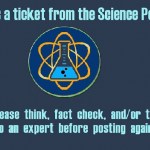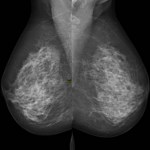overdiagnosis
If you were to rely on much of what you see in the mainstream media and on social media, you probably have the impression that we are not doing very well against cancer. Indeed, a common trope I see in a lot of articles is that we are somehow "losing" the war on cancer. Just for yuks, I Googled the term "losing the war on cancer," and it didn't take long to find a lot of articles, both in the mainstream press and, more predictably, on alternative medicine-friendly websites making just that argument. Indeed, in 2011, which was the 40th anniversary of President Nixon's declaration of "war on…
A frequent topic of discussion on this blog is the concept of overdiagnosis. It’s a topic I’ve been writing about regularly since around 2007 or so and is defined as the detection in an asymptomatic person of disease that, if left alone, would never progress to endanger that person’s life or well-being within his or her lifetime. The problem with overdiagnosis is that it pretty much always leads to overtreatment, the treatment of overdiagnosed disease that is not health- or life-threatening. The key shortcoming in our knowledge that leads to overtreatment is that, once we detect disease with…
If there's one lesson that I like to emphasize while laying down my near-daily dose of Insolence, both Respectful and not-so-Respectful, it's that practicing medicine and surgery is complicated. Part of the reason that it's complicated is that for many diseases our understanding is incomplete, meaning that physicians have to apply existing science to their treatment as well as they can in the context of incomplete information and understanding. The biology of cancer, in particular, can be vexing. Some cancers appear to progress relentlessly, meaning that it's obvious that all of them must be…
One of the things that feels the weirdest about having done the same job, having been in the same specialty, for a longer and longer time is that you frequently feel, as the late, great Yogi Berra would have put it, déjà vu all over again. This is particularly true in science and medicine, where the same issues come up again and again and again, often with the same arguments on either side. Sometimes the same players are even involved. So it is with mammography recommendations. Indeed, I'm feeling déjà vu all over again right now, as I read headlines like Women advised to get mammograms later…
I've written more times than I can remember about the phenomenon of overdiagnosis and the phenomenon that is linked at the hip with it, overtreatment. Overdiagnosis is a problem that arises when large populations of asymptomatic, apparently healthy people are screened for a disease or a condition, the idea being that catching the disease at an earlier stage in its progression will allow for more successful treatment. Two prominent examples include—of course—screening for breast cancer with mammography and screening for prostate cancer with prostate-specific antigen (PSA) testing, and I've…
Mammography is a topic that, as a breast surgeon, I can't get away from. It's a useful tool that those of us who treat breast cancer patients have used for over 30 years to detect breast cancer in asymptomatic women and thus (or so we hope) decrease their risk of dying of breast cancer through early intervention. We have always known, however, that mammography is an imperfect tool. Oddly enough, its imperfections come from two different directions. On the one hand, in women with dense breasts its sensitivity can be maddeningly low, leading it to miss breast cancers camouflaged by the…
As I write this, I am winging my way home from the 2014 meeting of the American Association for Cancer Research (AACR, Twitter hashtag #AACR14) in San Diego. (OK, I'm revising this to fit the format and, of course, the Insolence of this particular blog. Shockingly, I didn't have as much time to blog in San Diego as I had thought I would. Go figure.) Basically, the AACR meeting is one of the largest meetings of basic and translational cancer researchers in the world. I try to go every year, and pretty much have succeeded since around 1998 or 1999. As an "old-timer" who's attended at least a…
One issue that keeps coming up time and time again for me is the issue of screening for cancer. Because I'm primarily a breast cancer surgeon in my clinical life, that means mammography, although many of the same issues come up time and time again in discussions of using prostate-specific antigen (PSA) screening for prostate cancer. Over time, my position regarding how to screen and when to screen has vacillated—er, um, evolved, yeah, that's it—in response to new evidence, although the core, including my conclusion that women should definitely be screened beginning at age 50 and that it's…
I think the message may finally getting through.
That message is that it's not always the best strategy to treat cancer aggressively. Don't get me wrong. If I have acute leukemia, I know I'll need the big guns, every bit of chemotherapy appropriate to the disease that modern oncology can throw at it up to and including a bone marrow transplant. But what about prostate cancer? Breast cancer? Thyroid cancer? It turns out that more treatment isn't always better for these diseases, depending on the subtype, and in some cases, such as early stage prostate cancer of low aggressiveness, it is quite…
A few weeks ago, Matt Stevens, the National Guard captain and medic who served in Iraq and whom I mentioned in my Scientific American article, "The Post-Traumatic Stress Trap, wrote me an email about the social unease he often encountered when he showed any behavior that might remind people he had served in Iraq -- a greater seriousness, an impatience with petty concerns or inefficiency, or even just talking about the place.
I have begun to think of military PTSD as to some extent a civilian problem rather than a soldier problem. To expand slightly here; civilians/politicians send soldiers…
Below are materials supplementing my story "The Post-Traumatic Stress Trap," Scientific American, April 2009. (You can find the story here and my blog post introducing it here.) I'm starting with annotated sources, source materials, and a bit of multimedia. I hope to add a couple sidebars that didn't fit in the main piece -- though those may end up at the main blog, so you may want to keep an eye there or subscribe via RSS or Atom.
Main sources and documents in "The Post-Traumatic Stress Trap."
These are organized by story section, roughly in the order the relevant material appears.…
My story in the April 2009 Scientific American story, "The Post-Traumatic Stress Trap", just went online. Here's the opening:
In 2006, soon after returning from military service in Ramadi, Iraq, during the bloodiest
period of the war, Captain Matt Stevens of the Vermont National Guard began to have a problem with PTSD, or post-traumatic stress disorder. Stevens's problem was not that he had PTSD. It was that he began to have doubts about PTSD: the condition was real enough, but as a diagnosis he saw it being wildly, even dangerously, overextended.
[snip]
"Clinicians aren't separating the…





